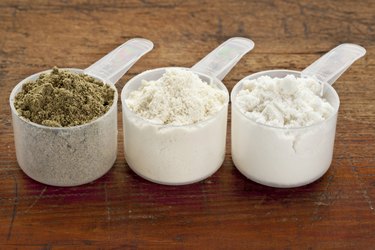
Although the nutritional values for cow's milk and goat's milk are similar and can have a positive impact on your body's growth and development, one particular protein, known as whey protein, may be more concentrated in goat's milk and, depending on your body's needs, could have a greater health benefit.
About Whey Protein
Video of the Day
Whey protein, which is found in a lot of dairy products as well as energy bars and powdered protein drinks, helps increase the rate at which your muscles grow and can aid in weight management. Packaged foods with whey protein have "whey protein isolate," "whey protein concentrate" or "hydrolyzed whey protein" in the ingredients list. Whey protein powder can also be added as a supplement to several common foods like oatmeal and soap. Whey protein contains the complete group of essential amino acids your body cannot make. One of whey protein's amino acids, leucine, helps the synthesis of muscle protein. It may also improve glucose tolerance, prevent fatty liver and reduce tissue inflammation due to obesity.
Video of the Day
Whey Protein in Cow's and Goat's Milk
Several types of proteins found in cow's and goat's milk act as enzymes, transport nutrients, increase growth and help your body resist diseases. Whey proteins produced by the mammary gland of cows and goats consist mainly of beta-lactoglobulin and alpha-lactalbumin, although other whey proteins such as immunoglobulins, lactoferrin and serum albumin, a serum protein, also are present. Beta-lactoglobulin may be the cause of a common condition known as milk protein allergy, which occurs when some of the whey protein is not fully digested in the intestines. The body recognizes the extra protein as a threat to the intestines, triggering a response from the immune system. Alpha-lactalbumin makes up approximately 25 percent of whey proteins and works to synthesize lactose, the sugar found in milk. Serum albumin is responsible for carrying fatty acids in the blood.
Cow's Milk vs. Goat's Milk Whey Proteins
The presence of whey proteins in milk varies with the type of animal, the lactation period and other factors. In a 2004 article in "The EFSA Journal," the European Food Safety Authority evaluated goat's milk as a source of protein for infant formulas. The group noted several differences specifically between the whey proteins in goat's milk versus cow's milk and concluded that three of the main whey proteins, alpha-lactalbumin, beta-lactoglobulin and serum albumin, were more highly concentrated in goat's milk. The alpha-lactalbumin in cow's milk was measured at 1.2 grams per liter, while in goat milk it was almost double at 2.2 grams per liter. Beta-lactoglobulin in goat's milk was just as significant at 4.9 grams per liter versus cow's milk at 3.0. The largest difference was in the serum albumin, which was significantly higher in goat's milk, approximately three times as high as in cow's milk at 1.2 versus 0.4 grams per liter.
Nutritional Benefits of Goat's Milk vs. Cow's Milk
The higher concentration of whey proteins in goat's milk would seem to indicate that it can provide more nutrition than cow's milk. However, if you have a milk protein allergy, this may not be a good choice, as your intestines will have more leftover proteins to deal with. In some cases, those who have been unable to ingest cow's milk in the past have safely been able to drink goat's milk, although scientists are still not sure why. One theory is that anti-inflammatory compounds known as oligosaccharides found in goat's milk can actually ease digestion while inside the intestines. A study published in "The Journal of Nutrition" in March 2006 showed how the oligosaccharides in goat's milk eased inflammation in rats with colitis and other bowel difficulties.